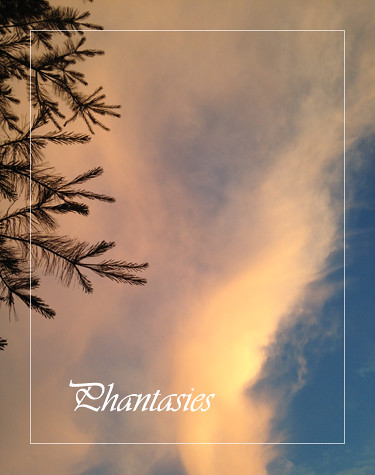
Volume XIII, Issue II
Phantasies
By George Macdonald, Chapter 24
We are ne'er like angels till our passions die."
~ Thomas Dekker.
This wretched Inn, where we scarce stay to baite,
We call our dwelling-place:
We call one step a race:
But angels in their full enlightened state,
Angels, who live, and know what 'tis to be,
Who all the nonsense of our language see,
Who speak things, and our words, their ill-drawn
Pictures, scorn,
When we, by a foolish figure, say,
Behold an old man Dead! then they
Speak properly, and cry,
Behold a man-child born!"
~ Abraham Cowley
I was dead, and right content. I lay in my coffin, with my hands folded in peace. The knight, and the lady I loved, wept over me.
Her tears fell on my face.
Ah!" said the knight, "I rushed amongst them like a madman. I hewed them down like brushwood. Their swords battered on me like hail, but hurt me not. I cut a lane through to my friend. He was dead. But he had throttled the monster, and I had to cut the handful out of its throat, before I could disengage and carry off his body. They dared not molest me as I brought him back."
He has died well," said the lady.
My spirit rejoiced. They left me to my repose. I felt as if a cool hand had been laid upon my heart, and had stilled it. My soul was like a summer evening, after a heavy fall of rain, when the drops are yet glistening on the trees in the last rays of the down-going sun, and the wind of the twilight has begun to blow. The hot fever of life had gone by, and I breathed the clear mountain-air of the land of Death. I had never dreamed of such blessedness. It was not that I had in any way ceased to be what I had been. The very fact that anything can die, implies the existence of something that cannot die; which must either take to itself another form, as when the seed that is sown dies, and arises again; or, in conscious existence, may, perhaps, continue to lead a purely spiritual life. If my passions were dead, the souls of the passions, those essential mysteries of the spirit which had imbodied themselves in the passions, and had given to them all their glory and wonderment, yet lived, yet glowed, with a pure, undying fire. They rose above their vanishing earthly garments, and disclosed themselves angels of light. But oh, how beautiful beyond the old form! I lay thus for a time, and lived as it were an unradiating existence; my soul a motionless lake, that received all things and gave nothing back; satisfied in still contemplation, and spiritual consciousness.
Ere long, they bore me to my grave. Never tired child lay down in his white bed, and heard the sound of his playthings being laid aside for the night, with a more luxurious satisfaction of repose than I knew, when I felt the coffin settle on the firm earth, and heard the sound of the falling mould upon its lid. It has not the same hollow rattle within the coffin, that it sends up to the edge of the grave. They buried me in no graveyard. They loved me too much for that, I thank them; but they laid me in the grounds of their own castle, amid many trees; where, as it was spring-time, were growing primroses, and blue-bells, and all the families of the woods
Now that I lay in her bosom, the whole earth, and each of her many births, was as a body to me, at my will. I seemed to feel the great heart of the mother beating into mine, and feeding me with her own life, her own essential being and nature. I heard the footsteps of my friends above, and they sent a thrill through my heart. I knew that the helpers had gone, and that the knight and the lady remained, and spoke low, gentle, tearful words of him who lay beneath the yet wounded sod. I rose into a single large primrose that grew by the edge of the grave, and from the window of its humble, trusting face, looked full in the countenance of the lady. I felt that I could manifest myself in the primrose; that it said a part of what I wanted to say; just as in the old time, I had used to betake myself to a song for the same end. The flower caught her eye. She stooped and plucked it, saying, "Oh, you beautiful creature!" and, lightly kissing it, put it in her bosom. It was the first kiss she had ever given me. But the flower soon began to wither, and I forsook it.
It was evening. The sun was below the horizon; but his rosy beams yet illuminated a feathery cloud, that floated high above the world. I arose, I reached the cloud; and, throwing myself upon it, floated with it in sight of the sinking sun. He sank, and the cloud grew gray; but the grayness touched not my heart. It carried its rose-hue within; for now I could love without needing to be loved again. The moon came gliding up with all the past in her wan face. She changed my couch into a ghostly pallor, and threw all the earth below as to the bottom of a pale sea of dreams. But she could not make me sad. I knew now, that it is by loving, and not by being loved, that one can come nearest the soul of another; yea, that, where two love, it is the loving of each other, and not the being loved by each other, that originates and perfects and assures their blessedness. I knew that love gives to him that loveth, power over any soul beloved, even if that soul know him not, bringing him inwardly close to that spirit; a power that cannot be but for good; for in proportion as selfishness intrudes, the love ceases, and the power which springs therefrom dies. Yet all love will, one day, meet with its return. All true love will, one day, behold its own image in the eyes of the beloved, and be humbly glad. This is possible in the realms of lofty Death. "Ah! my friends," thought I, "how I will tend you, and wait upon you, and haunt you with my love."
My floating chariot bore me over a great city. Its faint dull sound steamed up into the air--a sound--how composed?" How many hopeless cries," thought I, "and how many mad shouts go to make up the tumult, here so faint where I float in eternal peace, knowing that they will one day be stilled in the surrounding calm, and that despair dies into infinite hope, and the seeming impossible there, is the law here!
But, O pale-faced women, and gloomy-browed men, and forgotten children, how I will wait on you, and minister to you, and, putting my arms about you in the dark, think hope into your hearts, when you fancy no one is near! Soon as my senses have all come back, and have grown accustomed to this new blessed life, I will be among you with the love that healeth."
With this, a pang and a terrible shudder went through me; a writhing as of death convulsed me; and I became once again conscious of a more limited, even a bodily and earthly life.
(to be continued)
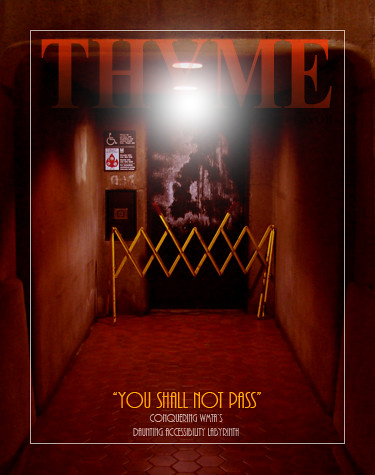
Elevator to Surface, Smithsonian Station in the Washington Metro.
Take Metro In a Wheelchair, Just Once
[click to read]
Do Metro executives know what the Metro is like for a person who uses a wheelchair? (read more)
A New Proposal for 'Elysian Lilies'
By Bob Kirchman
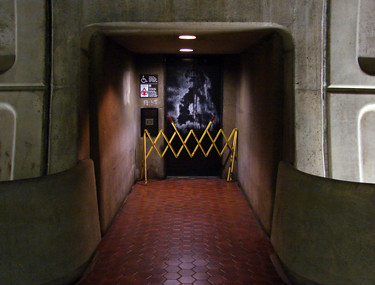
In Metro's Smithsonian Station, the Elevator is tucked into a dark alcove that is poorly marked. If you forget to check the status updates for elevators, you might encounter this scene... the elevator is out of service.
In the older Metro Stations in Washington D. C., the elevators might seem like an afterthought. In Smithsonian Station, the elevator sits in a dark alcove and is easily missed. Harry Weese designed the stations as a crypt, of sorts, to the Federal City. He wanted you to know you were underground.
Newer Metro stations have two elevators side by side and they are large enough for two people in wheelchairs to ride together. Smithsonian Station's elevator is relatively small. Adding to the claustrophobia is the dark alcove. While the vaulted stations and open escalators are elegant in their muted illumination, a case might be made for the elevator alcove needing to visually signal connection to the world above.
To that end, a variation of the 'Elysian Lilies' mural is designed below, along with a brighter ceiling light and a brighter elevator door.
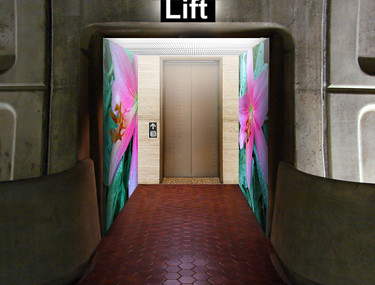
'Elysian Lilies' Mural Design for a Lift Alcove. Bob Kirchman
Panda Popularity Personified
Kids and Pandas are Inseparable at DC Zoo
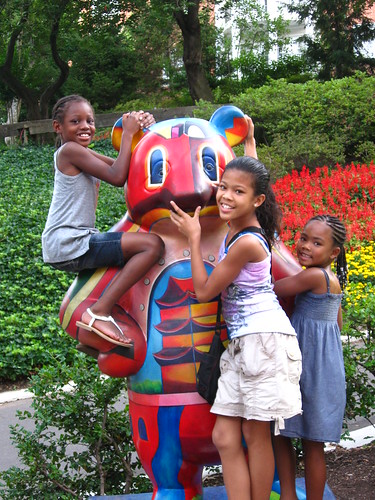
A panda sculpture at the National Zoo Metro station attracts attention. Photo by Bob Kirchman
The Challenge of Leadership
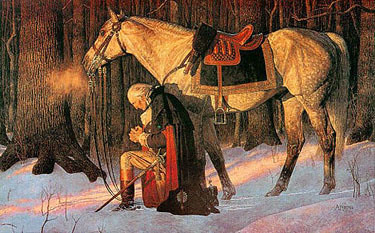
"The Prayer at Valley Forge" by Arnold Friberg is one of the best known paintings of the American Revolution. It depicts George Washington at Valley Forge.
No doubt, George Washington knew the challenge of leadership well. He began his career without a full college degree, but at the age of sixteen he obtained his surveyer's certificate from The College of William and Mary. At an age when most modern young men are playing video games, he was out discovering and marking an actual country! He did do something akin to the actions of modern young men when he discreetly carved his initials into Rock Bridge County's natural wonder, Natural Bridge!
Washington is noted for his military career, but historian James Hodges, Ph.D.gives us some unique insight into the man's character:
At the Battle of Brandywine in September 1777, a particularly brutal battle with much carnage on both sides, a fox terrier got lost between the lines. The little dog was captured by the Americans, who saw inscribed in his collar: “Property of General Howe.” Washington made sure the little dog was fed, cleaned and treated well. Under a flag of truce, Alexander Hamilton delivered the dog to General Howe, who had suffered great mental anguish thinking his little terrier had been lost to him forever.
Washington had been passionately fond of horses from early boyhood, and owned his first horse at 17. His mother, Mary Ball Washington, was a skilled horsewoman who taught young George how to train horses using only the gentlest of methods, and to never resort to any cruelty. Washington learned that harsh training methods were counter-productive, because horses treated with respect are eager to please their riders." [1.]
At the second battle of Trenton, on January 2, 1777, it was clearly evident that Washington's great charger Nelson returned the affection of his rider. Though cannon shells were bursting around them, man and horse stood firm. To those men Washington led into battle, they stood together as a symbol of strength. A soldier writes: “As I crossed the bridge crowded with fellow soldiers, I brushed up against the boot of the man and flank of the horse. Both seemed to exude courage.”
After the great war was over, Washington indeed became President of the nation he had helped to create. His leadership skills would be tested in the days of the Newburgh Conspiracy, where he would avert a military coup. The young nation's coffers were empty. The Continental Army had not been fully paid, and an uprising was brewing. There was talk of taking up arms against the Congress. Washington went to his officers and appealed to them in an emotional address on March 15, 1783.
Cool heads prevailed and Congress voted on a plan to pay the men. Interestingly, Washington distrusted the notion of political parties. He never aligned with one himself, though those around him were crafting the foundation for the two party system we have today. Perhaps the man's own sayings tell us volumes about his life and its motivations: [2.]
It is impossible to rightly govern the world without G-d and Bible."
The propitious smiles of Heaven can never be expected on a nation that disregards the eternal rules of order and right which Heaven itself has ordained”
Make sure you are doing what G-d wants you to do---then do it with all your strength."
What students would learn in American schools above all is the religion of Jesus Christ.” "It is the duty of all Nations to acknowledge the providence of Almighty G-d, to obey his will, to be grateful for his benefits, and humbly to implore his protection and favors."
My mother was the most beautiful woman I ever saw. All I am I owe to my mother. I attribute my success in life to the moral, intellectual and physical education I received from her."
The General hopes and trusts that every officer and man will endeavor to live and act as becomes a Christian soldier defending the dearest rights and liberties of his country."
If to please the people, we offer what we ourselves disapprove, how can we afterwards defend our work? Let us raise a standard to which the wise and honest can repair. The rest is in the hands of G-d."
No people can be bound to acknowledge the Invisible Hand which conducts the affairs of men more than the people of the United States. Every step by which they have advanced to the character of an independent nation seems to have been distinguished by some token of providential agency"
I am sure that never was a people, who had more reason to acknowledge a Divine interposition in their affairs, than those of the United States; and I should be pained to believe that they have forgotten that agency, which was so often manifested during our Revolution, or that they failed to consider the omnipotence of that G-d who is alone able to protect them.”
Happiness and moral duty are inseparably connected.”
I earnestly pray that the Omnipotent Being who has not deserted the cause of America in the hour of its extremist hazard, will never yield so fair a heritage of freedom a prey to "Anarchy" or "Despotism"."
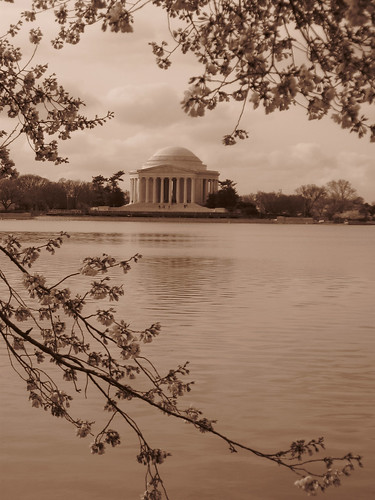
Cherry Blossoms frame the Jefferson Memorial on the Washington, D. C. Tidal Basin. Photo by Bob Kirchman
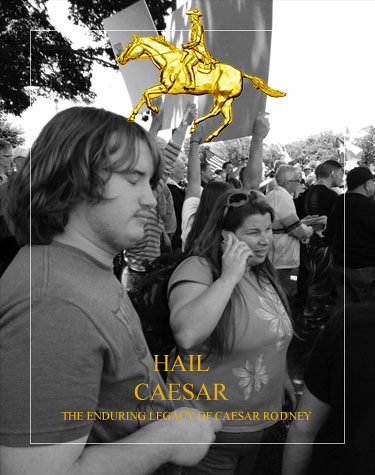
A Patriot's Legacy.
Caesar Rodney's Midnight Ride
Now one was neither Tory nor Whig; it was either dependence or independence.” Caesar Rodney, after Lexington and Concord.
We all know the famous story of Paul Revere's midnight ride. Virginians celebrate the memory of Jack Jouett, who rode to Monticello to warn Thomas Jefferson of approaching British troops.Jefferson and the Virginia Legislature were able to escape across the Blue Ridge Mountains to Staunton. Still, the most memorable midnight ride that saved the young republic has to be that of Caesar Rodney. Without Rodney's ride, there would not have been a republic at all.
Caesar Rodney was born in 1728 on his family's 800 acre farm, Byfield, on St. Jones Neck in East Dover Hundred, Kent County, Delaware. The family could trace its ancestry to the Adelmare family of Treviso, Italy. Caesar Rodney's farm was a large one, worked by slaves, and it provided wheat and barley to markets in Philadelphia. His brother Thomas described him as possessing a: "great fund of wit and humor of the pleasing kind, so that his conversation was always bright and strong and conducted by wisdom... He always lived a bachelor, was generally esteemed, and indeed very popular." Indeed, his talents found him taking his place in public service. He served as sheriff and in a number of other positions. He joined Thomas McKean as a delegate to the Stamp Act Congress in 1765 and was the Brigadier General of the Delaware Militia. He went on to serve in the Continental Congress.
Here is where he made his most courageous contribution to the cause of American independence. In 1776 the vote to adopt the Declaration saw the Delaware delegation deadlocked. This was a problem as the delegates to the convention had decided that an all or nothing approach was essential. Of Delaware's two present delegates Mckean favored independence. The other delegate, George Read, did not. Rodney, who was also qualified to vote, was at home performing his duties as General of the militia when the initial voting took place. Mckean had sent word to Rodney that his vote would be needed in Philadelphia... but the message never got to him. Rodney was a bachelor and his love interest at the time was being used by the Tories to divert his participation! She was intercepting the messages! By the time McKean's message finally got to Rodney, the first deadlocked vote had already taken place and it was well into the evening. Rodney mounted his horse and rode through a great thunderstorm along the muddy road to Philadelphia. Lightning illuminated the wet road as he sloshed along as rapidly as conditions would allow. For seventy miles he rode.
Rodney was not a well man. He suffered from a rare form of cancer that disfigured his face and sapped his strength. No doubt he knew the ride could kill him, but he pressed on. He was committed to an act of treason that might lead to his death if he did survive. But he pressed on through the darkness. He reached Philadelphia by mid-morning. Spattered with mud, he stepped into the chamber just in time to cast his historic vote. Now the votes by all colonies who actually voted was unanimous! The framers rightly considered this essential to the success of the Declaration. Without Caesar Rodney's heroic ride, there would have not been a July 4th for us to celebrate! Rodney served in the war effort, even fighting alongside George Washington, who said of him: “The readiness with which you took to the field at the period most critical to our affairs, the industry you used in bringing out the militia of the Delaware State and the alertness observed by you in forwarding on the troops from Trenton, reflect the highest honor on your character and place your attachment to the cause in a most distinguished point of view.” As a young republic took its place in the world, Rodney continued to serve but his health was now rapidly declining. He died in 1784. [2.]
His legacy lives on today though. My friend Brandy Leigh Messick and her four sons are proud descendents of this great patriot and continue his mission to promote the values of this great nation to this day! Special thanks to her for providing additional background for this article.
